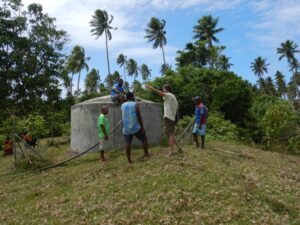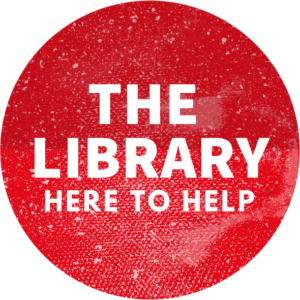Each month, the Library highlights the work of one of our remarkable researchers. So, this month, we’re profiling Dr Mark Love, an anthropologist and Research Fellow in the Australian Rivers Institute and International WaterCentre. Mark’s research focuses on political ecology, community governance, development effectiveness, intangible cultural heritage, applied linguistics, and water, sanitation and hygiene (WASH). Read about his passion for community-led development in the Pacific Islands and his interesting journey into a research career.
What path led you to your research?
I am a cultural anthropologist with a focus on applied anthropology; however, this is my third career! I left school at 16 to work in the film industry, but soon developed a passion for travel, history and non-western cultures. To support this interest, I established a socially responsible import business, focusing on art, handicraft and apparel from India, Nepal, Thailand and Indonesia. Unsatisfied with business, but still fascinated by history and culture of non-western societies, I completed Year 12 and commenced my undergraduate degree in anthropology at 30 years of age (it’s never too late!). During my undergraduate studies I also undertook a minor in community development – I always planned to do applied work.
My honours thesis focused on marine conservation in the Solomon Islands whilst my PhD was an ethnography of interventions in several villages in Vanuatu, from missionisation through to contemporary development projects. Over the past 19 years I have worked in the Pacific Islands on a range of topics: political ecology, community governance, development studies, applied linguistics and for the last five years, water, sanitation and hygiene (WASH). I came to WASH by accident, but it makes total sense as it intersects with my core interests: culture and history, community governance and development, human well-being and environmental sustainability.

Tap stand, Lambulambu, Velle Lavella, Western Province, Solomon Islands. Image courtesy of Dr Mark Love.
‘We employ a mix of formative and action research methods to provide evidence-based insights on how to better support community water management outcomes’
Can you tell us a bit about the projects you are currently working on?
I am currently working on several WASH-related applied research projects in the Pacific Islands. The main research project Supporting decentralised rural water supply in Pacific islands is an extension on our earlier work and is a collaboration with Solomon Islands National University, the University of the South Pacific (Vanuatu and Fiji) and key local government agencies in each country. We employ a mix of formative and action research methods to provide evidence-based insights on how to better support community water management outcomes. In this iteration of the research there is a stronger and more specific focus on understanding the water sector decentralisation process in each country. This aims to identify formal, informal and emergent networks as possible community water management allies. It also explores the potential for water committees to engage in beyond-community water resource management. Better understanding and integrating climate change considerations into water management activities will result in improved water safety planning processes. The ultimate goal is more climate-resilient WASH outcomes.
What sparked your passion for this research area?
The majority of Pacific Islanders reside in rural areas, and many people suffer from preventable water-borne diseases. Moreover, women are primarily responsible for water related activities and thus experience the greatest burden from insufficient or poorly maintained/managed water systems.
In rural Fiji, Vanuatu and the Solomon Islands, water committees, who are made-up of community volunteers, are responsible for the day-to-day management of water systems. Hence, water committees are critical to ensuring the provision of safe, reliable, sufficient and climate-resilient water security. However, water committees typically do not endure or function in a sustainable and proactive manner: they need further capacity development with ongoing mentoring and motivation. Currently, across the Pacific Islands, countries are further decentralising policies and practices to better support the community-based water management model. I am intrigued by how an in-depth understanding of local context – culture, history, policies, government and community structures and capabilities – can improve water management practices and thus enhance community wellbeing.

Mark Love with Provincial Water Supervisor Richard Tasi (Department of Water Resources, Malekula island, Vanuatu) with members of the Walarano water committee inspecting their reservoir tank. Image courtesy of Heather Molitambe (University of the South Pacific, Emalus campus, Vanuatu).
‘If you are passionate about something stick with it, even when the odds are against you…’
Do you have any advice for researchers just starting out?
In my experience the key to a successful and fulfilling research career has been to identify and surround myself with collegial and supportive peers. Working in transdisciplinary teams and in meaningful partnership with colleagues in other countries, both academic and non-academic, has been amongst the most rewarding moments of my career.
Being strategic in terms of publishing is important, but it’s not the only way to survive and thrive in academia. The tertiary sector is (ever) slowly waking up to the fact that if you want your work to have a real-world impact, it’s not just about publishing in journals (governments in the Pacific, for instance, don’t read journals!) My last advice is simply this: If you are passionate about something stick with it, even when the odds are against you. Around 5% of people in Australia with an anthropology degree ever actually get to practice anthropology. If I had let that discourage me, I would have missed out on nearly 20 years of amazing experiences and friendships.
Griffith University is proud to produce world-class research contributing to the Sustainable Development Goals
Find out more about the Sustainable Development Goals.





